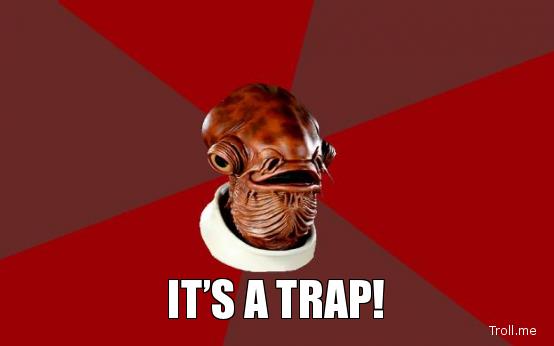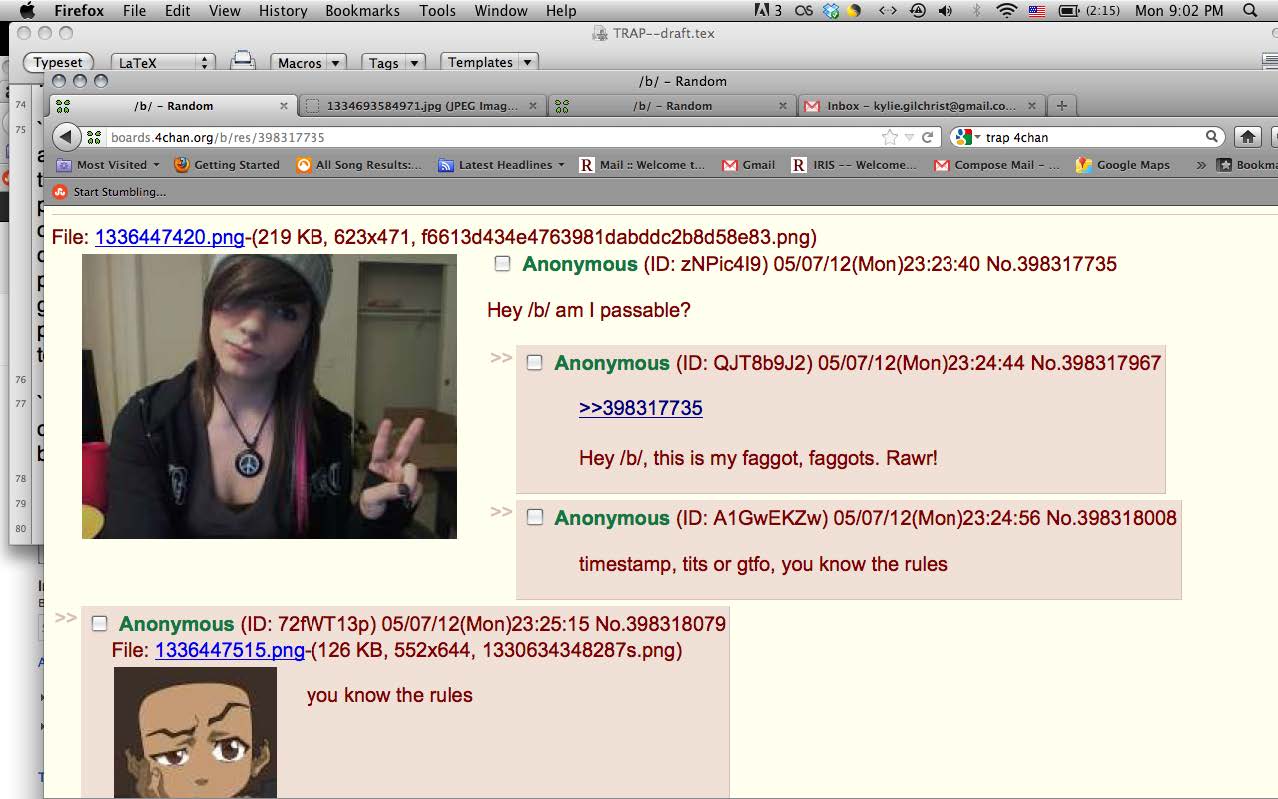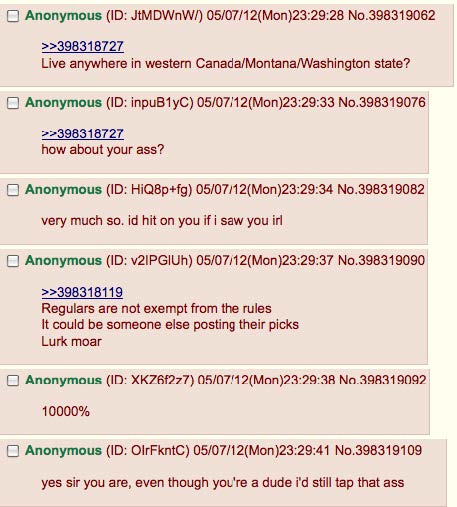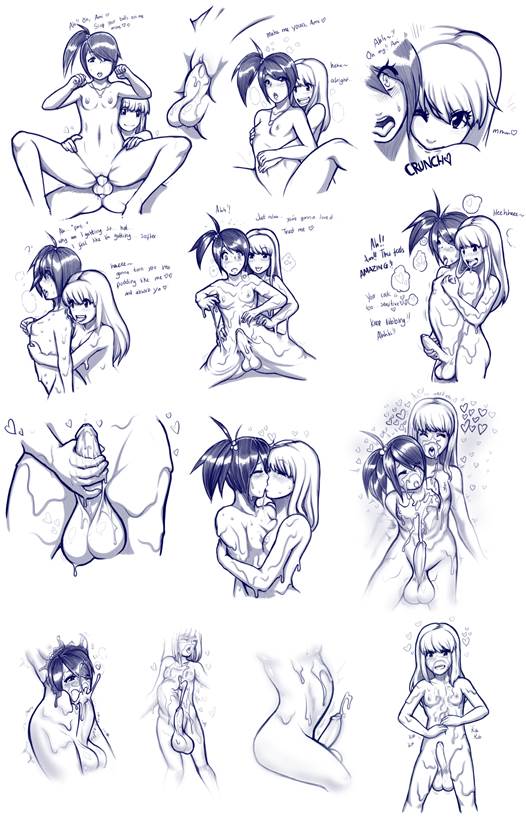Sara Pheasant
Of Traps and Trolling: Brain Melt in the Digital Future
ISSUE 31 | STRATEGIES OF TOGETHERNESS | AUG 2013



4Chan is a trap. In all senses of the word—or maybe, the form.
Trap, on 4Chan, is what you would call a transgendered woman who tricks a straight man into unwitting same-sex attraction. This experience is assumed to instill such a deep sense of surprise and disgust as only can be equated to Admiral Akbar’s betrayal when the Death Star ambushes the Jedi starship in Star Wars. His exclamation, ‘It’s a trap!’ is memorialized as the iconic metonym for this mode of deception, and has become common currency within 4Chan’s caustic culture of general antagonism. The trap is exemplified by the following, a diagram of a formidable steel rattrap juxtaposed with a junky GIF of a nude woman making flirtatious gestures. She smiles, winks, and uncrosses her legs to accidentally reveal her penis. The caption reads: didn’t see that coming!


Didn’t see that coming! could, in fact, be the motto of 4Chan, where virulent trolling, hard-core pornography, sickeningly (and disturbingly) cute manga, deadpan humor and the occasional sincere plea for help converge in brief moments of intimate connection. Posting on 4Chan is a dangerous game, and each individual post is itself a trap. OPs (Original Posters) throw out ironic and perverse posts as bait to fellow anons—if the bait is alluring and the trap a good one, posters assail each other with an endless barrage of responses. Threads are fast-fingered competitions that play out against the constant shadow of 404—‘page not found,’ meaning ultimate fail. They are kept afloat by popular interest as posters add new jibes, jokes, attacks and ploys to pull others into the running dialog and keep juicy threads flowing. Real livewires morph into epic flame wars, mass dumpings of coveted pornography and relentless trolling, all in the search of new lulz.
As an anarchic anti-archive that continually makes itself anew, 4Chan is ruled by a radically democratic ethos that makes the communal kitchen of an Occupy encampment seem like an orderly organization. It’s perceived as a colossal black hole of social waste—as Gawker infamously stated, “posting on 4Chan will melt your brain.”1 However, in its willful self-negation and uncontrollable irony 4Chan can hedge its bets against the circulation of digitized capital by making the absurdity of our immaterial economies into a grinning caricature. The prime value of 4Chan is circulation and exchange—don’t drop the ball or you’ll be mercilessly mocked for it. However, the fun of it all is its absolute uselessness, found in knowing that the ball is going to disappear as soon as it’s dropped anyways.
Opposed to Facebook’s currency of generic goodwill—if you can’t say you like it, don’t say anything at all—4Chan is a trolling machine constantly on the verge of flying off its hinges. No one “likes” each other on 4Chan. And where Farmville mines an immaterial simulation of agricultural labor for real capital gain, 4Chan creates a community of people who make unavoidably clear that they are working very hard to do absolutely nothing. It’s is a self-described community of losers, outcasts and shut-ins, proudly alienated from mainstream society, sociability and profitability. The radically heterogeneous bunch of oddballs who associate around 4Chan define themselves in opposition to the NORP ideal—that of Normal Ordinary Responsible People who “go to work, have a circle of friends in the real world, go to events outside their homes, have adequate conversational skills and have very little to no mental disabilities that would otherwise drive them to go on the Internet.”2 Valorizing the pizza-faced thirty-year-old losers occupying their mother’s basement, they create a culture around opting-out in a violently visible way. Their alternative economy eschews gifts of food and friendship in favor of tricks and traps, propelling ironic caricature and hyperbolic offense around an increasingly tight gamut of lulz. Their economy finds its quintessential form in The Game—that endlessly reoccurring and purposefully pointless practice in which we are all playing the game until we think of it—and then we’ve lost.

4Chan is, by no means, a haven for positive cultural politics. Blatant racism, misogyny, homophobia and all other manner of virulent hate speech run rampant across the boards, particularly notorious for their anti-girl culture. Women are lumped together under the term femanon—a robotically sexualized body truly useful for one thing. 4Chan coined GOTIS (Girl on the Internet Syndrome), which sounds like a terrible foot fungus, and posters who present themselves in female bodies are treated as such. As defined by the Encyclopedia Dramatica, GOTIS “is a condition all females on the Internet must avoid at all costs. It is a common trap almost completely reserved for the fairer sex, and usually the fatties at that.” This particular trap is tits or GTFO—in which suspected fem-bots are met with a flood of demands to post boob pics or Get The Fuck Out. This particular tactic is one gem among 4Chan’s minefield of the misogynist double-bind: women are expected to bare their chests like Barbie dolls while berated at the same time for exploiting hard-working, everyday dudes with their feminine wiles.
For anons, the social construct of femininity is the Holy Grail of NORP culture, and as such, the embodiment of all evil. But the misogyny that keeps these caustic affects circulating is so comically stereotypical, such a caricature of heteronormativity, that it too just might be a trap. It’s a little queer that all those dudes on 4Chan call themselves fags—a ubiquitous term on 4Chan made into specific monikers or affectionate nicknames through prefixes of all sorts. Newfag, oldfag, animefag, straightfag, gayfag… each denotes general belonging within the 4Chan community while also distinguishing the user’s particular, unique identity. Of course, women—femanons—are allowed no such dynamism. However, neither are men who conform to their expected gender roles. Men who perform the male standard of chivalrous hero by defending the honor of female posters in hopes of seducing them meet the humiliating barrage of offense reserved specially for white knights.
As –fags of all kinds come together in their alienation from and oppression by NORP-y narratives, the femanon’s image offers a convenient scapegoat and a typically exaggerated caricature of the unequal relations of production and exchange inherent in structures of patriarchy and heteronormativity. Anon fags definitely exhibit a one-sided complaint in this regard—I’ve yet to see much awareness, let alone analysis, of issues specific to performing female identity such as socially-inculcated passivity, objectified images or unequal burdens of affective labor. However, the extreme virulence in posters’ conviction that women willfully exploit men through sexual attraction points towards a shared sense that the traditional gender roles of NORP culture are structurally oppressive and untenable.
4Chan’s perverse critique of patriarchal norms, if we can call it that, wouldn’t be worth considering if it didn’t open spaces for non-normative gender expressions. However, not only does 4Chan open itself to queer performances, it encourages and rewards the most inventive of such—in its own special ways. Fetish play and pornography of any kind (not) imaginable are 4Chan’s prime currency—and it’s particularly in this space of outlandish sexual fantasy that posters enact radically, perhaps terrifyingly, different forms of intimacy.

On 4Chan, real-life traps possess an elusive aura and a strange allure. The androgynous poster presenting themselves as genderqueer is somehow different enough, perhaps just far enough outside of codified memes and social stereotypes, not to be consumed by the trolls. They create a rare sort of space on 4Chan where the circulation of antagonism melts into leaky, ambivalent feelings, and posters butt up against each other with little to exchange but intimacy.
Such a space emerged in one thread I came across, in which a young self-identified trap posted a selfie with the message, “hey /b/, am I passable?” Nicknamed ‘the pretty trap’ by successive posters, the trap was met with an equal mixture of hostile trolling, genuinely positive approval, declarations of love and solicitation from gay and straight men alike. The thread next branched into a running discussion of gender identity tactics on the board. Someone tried to hit the trap with tits or GTFO, and a boiling debate ensued. Is tits or GTFO applicable, appropriate, even physically possible? Posters debated back and forth—should the game be changed to ass or GTFO? One authoritative poster finally settled the dilemma by reminding the community that tits or GTFO only applied to femanons attempting to call attention to themselves on boards by means of their normalized gender performance. The poster asserted that the tactic must be reserved for situations where a self-presenting female poster comes in performing her outsider status (“lol im so random guise”) or attempting to exploit dudes by tempting them with sexual favors for their amusement or personal gain.
However, the trap in this thread is situated between gender norms as well as their dominant relations of exchange. Rather than derision and hostility, the ‘pretty trap’ compels interest and a mode of intimacy that allows posters to do more than poke at structures by playing their rules in overdrive. Rather, in the queered space of the trap, they start to poke at the rules themselves, and each other in turn. The trap’s original question to the board—“hey /b/, am I passable?”—enacts the form of the trap itself. It pulls posters into a lived and immediate space of exchange in which the battery-acid bile of their negative affects manages, in a moment, to corrode ego buffers and structurally determined relations alike.




The pretty trap asking to pass is asking to sublimate their individual self into the community; and likewise, the community into the self. It is a form of being together—a gooey and cramped way of sticking it out in the same small place, while sticking it to everyone else around you. (But, hey, it’s all part of the game.) It’s a lot like the “congested connectivity” Leo Bersani attributes to Caravaggio’s 1602 painting of the Taking of Christ, in which the weird lighting on an anonymous witness’s hand implicates him at the back of the scene, implicating all of us looking at this painting of the betrayal of our savior and, in the process, showing us how together we all are. The painting becomes a space of ‘illuminated relationality’—not a particularly comfortable place to be, but one in which we know each other to be there. It visualizes and spatializes our togetherness to make us think about the way in which we are with others, the structures that shape our belonging, and how we are caught in the cracks in between.

The Taking of Christ, Caravaggio, 1602.
Bersani looks outwards from art history to find other forms of ‘illuminated relationality’ in more current practices. He explores one such form in the practice of barebacking, asserting, not without controversy, that unprotected sex among potentially-HIV positive gay men is a radical way of being together in a community that’s driving itself forward on the fumes of its own negation. Bersani rejects simplistic attempts to explain barebacking in the Freudian terms of a culture enacting its death drive. Instead, he reframes this risky practice as an impulse towards a new way—a new form—of being together, a manifestation of a failed culture of monogamy and heteronormativity straining towards something different. Barebacking is a means of shattering the self to let others in, of rearranging the contours of our togetherness into new social forms. Bersani’s revaluation of barebacking is not a cry for political activism in the guise of reckless behavior. It is, rather, a request that we explore what happens when we think about how we fit in with others—or how we let others fit into us—in formal terms, and what new forms might emerge if we do so.

The form of being together that rules 4Chan is one that circulates within the prevailing spheres of monogamous family life and commerce, relations of ownership, control and dominance, but one that continually exceeds and undermines them—not through callous irony and perversion but rather a strange, sometimes nauseating and gut-churning and occasionally heart-wrenchingly sentimental desire for intimacy. For all anons’ belligerent hostility, antagonism, proud alienation and abjection, the engine of 4Chan’s meaningless economies isn’t actually fuelled by sarcasm and animosity. Such are practices, modes of being, in a culture where togetherness can actually be found in tearing each other apart. On 4Chan, posters coalesce around loneliness and longing for some sort of connection outside of themselves that is so vital it hurts. This ethos shouldn’t really seem all that foreign—when haven’t we all torn each other, or perhaps more frequently, ourselves, apart, for the express purpose of letting in what floats around us? We all need a good trap to melt our brains a little, to make our psyches hurt because we lost the game and we can’t remember why we’re stuck here, playing with these losers after all.


1 David Auerbach, “Anonymity as Culture: Treatise” (Triple Canopy: Feb 2012).
This article by David Auerbach and its counterpart, “Anonymity as Culture: Case Studies,” published in Triple Canopy’s 15th issue, Negative Infinity, provided invaluable inspiration for this piece, as well as a basic research foundation. The material discussed in this article and images presented come from personal research and spending far too much time on 4Chan.
2 As described on Encyclopedia Dramatica.
The Hypocrite Reader is free, but we publish some of the most fascinating writing on the internet. Our editors are volunteers and, until recently, so were our writers. During the 2020 coronavirus pandemic, we decided we needed to find a way to pay contributors for their work.
Help us pay writers (and our server bills) so we can keep this stuff coming. At that link, you can become a recurring backer on Patreon, where we offer thrilling rewards to our supporters. If you can't swing a monthly donation, you can also make a 1-time donation through our Ko-fi; even a few dollars helps!
The Hypocrite Reader operates without any kind of institutional support, and for the foreseeable future we plan to keep it that way. Your contributions are the only way we are able to keep doing what we do!
And if you'd like to read more of our useful, unexpected content, you can join our mailing list so that you'll hear from us when we publish.
